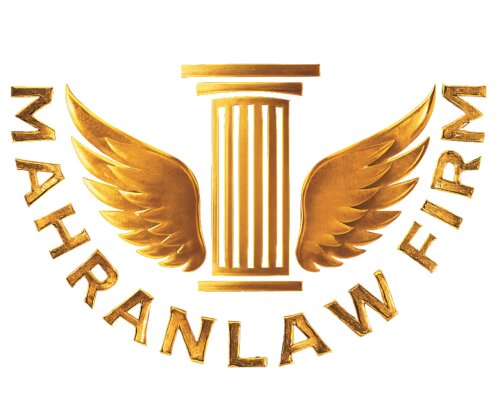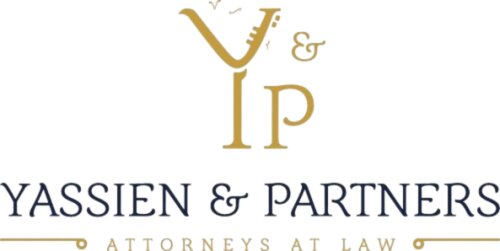Best Antitrust Litigation Lawyers in Agouza
Share your needs with us, get contacted by law firms.
Free. Takes 2 min.
List of the best lawyers in Agouza, Egypt
About Antitrust Litigation Law in Agouza, Egypt
Antitrust litigation in Agouza concerns disputes and enforcement actions arising from rules that protect competition in markets - for example, cases about price-fixing, market allocation, abuse of dominance, and unlawful mergers. Although Agouza is a district of Giza within Greater Cairo, antitrust matters follow national competition law and are handled through the established national enforcement agencies, administrative procedures, and the local judiciary. Local law firms and counsel based in Agouza commonly represent businesses and individuals in investigations, administrative proceedings before the competition authority, and civil litigation in Egyptian courts.
Why You May Need a Lawyer
Competition law is fact-sensitive and can involve significant financial and reputational risk. You should consider hiring a lawyer when any of the following situations apply:
- You are notified of an investigation or inspection by the national competition authority.
- You have been accused of participating in a cartel or collusive conduct.
- Your business is alleged to be abusing a dominant market position.
- You plan to complete a merger or acquisition that may raise competition concerns and may require notification or a clearance application.
- You are a business or consumer seeking damages or injunctive relief for harm caused by anti-competitive conduct.
- You need help drafting or implementing a compliance program to reduce future risk.
- You require assistance responding to information requests, preparing a leniency application, or negotiating settlements.
Local Laws Overview
Key legal and procedural features relevant to antitrust matters in Agouza and across Egypt include the following general points:
- National competition law prohibits anti-competitive agreements such as price-fixing and market-sharing, and prohibits the abuse of a dominant position in a relevant market.
- A national competition authority is responsible for investigating complaints, conducting dawn raids, imposing administrative sanctions, and issuing remedial orders. Enforcement may include fines and injunctive measures.
- Merger control - certain concentrations may require prior notification and clearance if they meet size or market thresholds under national rules. Filing requirements and timelines vary depending on the transaction and applicable thresholds.
- Private enforcement - injured parties may bring civil claims for damages and seek interim injunctive relief in the national courts. Criminal sanctions may apply in serious or flagrant cases depending on the specific provisions of the law and prosecutorial practice.
- Evidence-gathering tools - the authority may conduct inspections, request documents, and require sworn statements. Companies should have procedures for handling inspections and preserving relevant evidence.
- Remedies and sanctions - administrative remedies commonly include fines, orders to stop anti-competitive behavior, and structural or behavioral remedies in severe cases. Courts may award damages and order corrective measures in private suits.
- Appeal routes - decisions by the competition authority can typically be challenged through administrative or judicial appeal processes. Time limits and procedures for appeal are strictly enforced, so prompt legal advice is important.
Because procedural rules, thresholds, and penalties can change, and because some enforcement actions intersect with criminal or administrative law, it is important to work with counsel familiar with current national practice and with local courts in the Cairo and Giza area.
Frequently Asked Questions
What kinds of behavior typically trigger antitrust investigations?
Investigations most often begin with allegations of cartels - for example, agreements on prices, bid rigging, or market allocation. Other triggers include complaints about exclusionary conduct by a dominant firm, complaints from competitors or consumers, suspicious pricing patterns, and certain large mergers or acquisitions that may reduce competition.
Who enforces competition law and where are cases decided?
Competition law is enforced by a national competition authority. Administrative investigations and decisions are handled by that authority, while fines and remedies are imposed administratively. Private claims for damages and injunctions are pursued in the courts - typically economic, commercial, or civil courts in the Cairo and Giza judicial system. Decisions by the authority can usually be appealed to the judiciary under the administrative procedure.
Can an individual consumer bring an antitrust claim?
Yes. Both businesses and consumers who suffer loss from anti-competitive conduct are generally entitled to seek damages and injunctive relief through the courts. Representative or class-style actions may be limited, depending on procedural rules, so individual and collective remedies can differ in practice.
What penalties might a company face if found to have violated competition law?
Penalties may include administrative fines, orders to cease and desist, corrective measures, and in some cases structural remedies. Courts may award civil damages to injured parties. For severe or intentional violations, criminal liability or prosecutions may be possible depending on the national statute and prosecutorial discretion.
What should I do if the competition authority wants to inspect my premises?
Immediately contact counsel and follow a documented inspection plan. Preserve evidence and avoid destroying documents. Your lawyer can help assert valid privileges or confidentiality claims, ensure proper limits on the scope of the inspection, and negotiate for sealed or confidential treatment of sensitive materials. Do not obstruct investigators, but cooperate under legal guidance.
Is there a leniency program if my company was involved in a cartel?
Many competition regimes offer leniency programs that provide immunity or reduced fines to the first or early cooperating parties that fully disclose cartel participation and provide useful evidence. The rules and practical availability of leniency vary, and the timing and content of any leniency submission should be managed carefully with experienced counsel.
Do mergers always require prior notification?
Not always. Pre-merger notification requirements depend on thresholds set by national law - typically based on transaction value, market share, or the size of the parties. When thresholds are met, prior clearance is usually required. Even if notification is not mandatory, parties should consider the competition risks of the transaction and whether a voluntary filing is advisable.
How long do antitrust cases usually take?
Duration varies widely. Administrative investigations can take months to years depending on complexity. Court litigation can also be lengthy, especially if expert economic evidence is required and appeals are filed. Early legal assessment and active case management can shorten certain phases, and some disputes are resolved through settlement or remedies without lengthy trials.
What types of evidence are useful in antitrust litigation?
Useful evidence includes written communications between parties, internal emails and minutes, pricing and sales data, bid documents, market studies, witness statements, and expert economic analysis showing market definition and harm. Preserving contemporaneous documents and implementing litigation holds are critical once a dispute or investigation is foreseeable.
How do I choose the right lawyer for an antitrust matter in Agouza?
Look for lawyers or firms with specific experience in competition law, investigations, and litigation. Ask about prior cases handled, familiarity with the national competition authority, experience with merger filings, and access to economic experts. Confirm fee structures and communication practices, and consider local presence in Agouza or nearby Cairo for court appearances and meetings.
Additional Resources
Consider these types of resources when seeking more information or assistance with an antitrust matter in Agouza:
- The national competition authority - for guidance on investigation procedures, filing requirements, and public notices.
- The national ministry responsible for trade and industry - for policy and regulatory context.
- The consumer protection authority - for complaints that may relate to competition issues affecting consumers.
- Local bar associations - for referrals to qualified competition law practitioners and for verification of professional standing.
- University law clinics and centers that study competition law - for research, publications, and academic perspectives.
- Independent economic and financial experts or consulting firms - for market analysis and damages assessment in litigation.
Next Steps
If you believe you are involved in or affected by an antitrust issue in Agouza, take the following steps:
- Preserve evidence - immediately implement a litigation hold and stop any routine deletion of documents and electronic communications that could be relevant.
- Seek prompt legal advice from a lawyer experienced in competition law and local courts - early advice improves outcomes and helps manage risk.
- Prepare a factual timeline and gather key documents - contracts, invoices, emails, and commercial data are often essential.
- If you receive official notices or inspection requests, do not ignore them - respond through counsel and meet procedural deadlines.
- Consider compliance enhancements - adopt or update antitrust compliance policies, train staff, and designate a contact person for investigations.
- Evaluate settlement and litigation strategies with your lawyer - weigh the costs, risks, and benefits of negotiation, administrative remedies, and court actions.
Working with experienced local counsel will help you navigate the procedural requirements, protect your rights during investigations, and build the strongest possible position whether you are defending against allegations, seeking damages, or planning a merger.
Lawzana helps you find the best lawyers and law firms in Agouza through a curated and pre-screened list of qualified legal professionals. Our platform offers rankings and detailed profiles of attorneys and law firms, allowing you to compare based on practice areas, including Antitrust Litigation, experience, and client feedback.
Each profile includes a description of the firm's areas of practice, client reviews, team members and partners, year of establishment, spoken languages, office locations, contact information, social media presence, and any published articles or resources. Most firms on our platform speak English and are experienced in both local and international legal matters.
Get a quote from top-rated law firms in Agouza, Egypt — quickly, securely, and without unnecessary hassle.
Disclaimer:
The information provided on this page is for general informational purposes only and does not constitute legal advice. While we strive to ensure the accuracy and relevance of the content, legal information may change over time, and interpretations of the law can vary. You should always consult with a qualified legal professional for advice specific to your situation.
We disclaim all liability for actions taken or not taken based on the content of this page. If you believe any information is incorrect or outdated, please contact us, and we will review and update it where appropriate.










